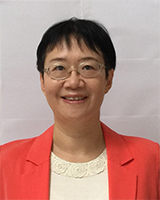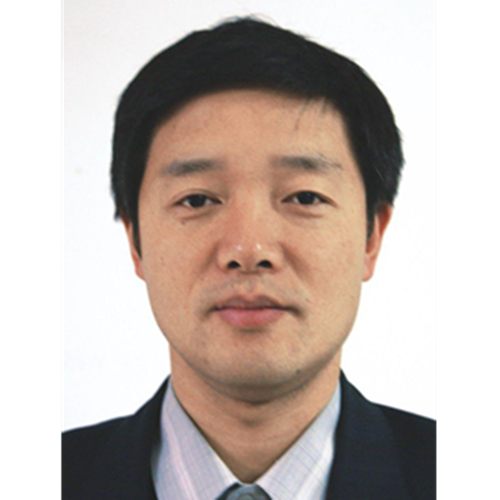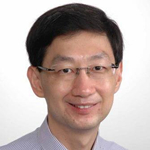Keynote Speakers
ICCDE 2022 Keynote & Invited Speakers

Prof. Ling Liu (IEEE Fellow)
Georgia Institute of Technology, USA
Ling Liu is a Professor in the
School of Computer Science at Georgia Institute
of Technology. She directs the research programs
in the Distributed Data Intensive Systems Lab (DiSL),
examining various aspects of large scale big
data-powered artificial intelligence (AI)
systems, and machine learning (ML) algorithms
and analytics, including performance,
availability, privacy, security and trust. Prof.
Liu is an elected IEEE Fellow, a recipient of
IEEE Computer Society Technical Achievement
Award (2012), and a recipient of the best paper
award from numerous top venues, including IEEE
ICDCS, WWW, ACM/IEEE CCGrid, IEEE Cloud, IEEE
ICWS. Prof. Liu served on editorial board of
over a dozen international journals, including
the editor in chief of IEEE Transactions on
Service Computing (2013-2016), and the editor in
chief of ACM Transactions on Internet Computing
(since 2019). Prof. Liu is a frequent keynote
speaker in top-tier venues in Big Data, AI and
ML systems and applications, Cloud Computing,
Services Computing, Privacy, Security and Trust.
Her current research is primarily supported by
USA National Science Foundation under CISE
programs, IBM and CISCO.
Speech Topic: Secure Object Detection on the Edge
Abstract: Deep neural networks (DNNs) have fueled the wide deployment of object detection models in a number of mission-critical domains, such as traffic sign detection on autonomous vehicles, and intrusion detection on surveillance systems. Recent studies have revealed that well trained DNN object detection models can be compromised under adversarial attacks, causing a victim detector to detect no object, fake objects, or wrong objects. However, few studies how to guarantee the robustness of object detection against adversarial manipulations. This keynote presents an in-depth understanding of vulnerabilities of deep object detection systems by analyzing the adversarial robustness under different DNN detector training algorithms, different attack strategies, different adverse effects and costs. I will then describe a set of mitigation strategies and algorithms that can high detection accuracy while guaranteeing adversarial robustness for real time object detection and edge video analytics.

Prof. Hai Jin (IEEE Fellow)
Huazhong University of Science and Technology, China
Hai Jin received the PhD degree in computer engineering from Huazhong University of Science and Technology, China in 1994. He is a Cheung Kung scholars chair professor of computer science and engineering with Huazhong University of Science and Technology. In 1996, he was awarded a German Academic Exchange Service fellowship to visit the Technical University of Chemnitz in Germany. He worked with The University of Hong Kong between 1998 and 2000, and as a visiting scholar with the University of Southern California between 1999 and 2000. His research interests include computer architecture, virtualization technology, cluster computing and cloud computing, peer-to-peer computing, network storage, and network security. He was awarded Excellent Youth Award from the National Science Foundation of China in 2001. He is the chief scientist of ChinaGrid, the largest grid computing project in China, and the chief scientists of National 973 Basic Research Program Project of Virtualization Technology of Computing System, and Cloud Security. He has co-authored 22 books and published more than 700 research papers. He is a fellow IEEE, CCF, and a life member of the ACM.

Prof. Peter Haddawy
Mahidol University, Thailand
Professor Haddawy received a BA in Mathematics from Pomona College in 1981 and MSc and PhD degrees in Computer Science from the University of Illinois-Urbana in 1986 and 1991, respectively. He was tenured Associate Professor in the Department of Electrical Engineering and Computer Science at the University of Wisconsin-Milwaukee, and Director of the Decision Systems and Artificial Intelligence Laboratory there through 2002. Subsequently, he served as Professor of Computer Science and Information Management at the Asian Institute of Technology (AIT) through 2010 and the Vice President for Academic Affairs from 2005 to 2010. He served in the United Nations as Director of UNU-IIST from 2010 through 2013. Professor Haddawy has been a Fulbright Fellow, Hanse-Wissenschaftskolleg Fellow, Avery Brundage Scholar, and Shell Oil Company Fellow. His research falls broadly in the areas of Artificial Intelligence, Medical Informatics, and Scientometrics and he has published over 130 refereed papers with his work widely cited. His research in Artificial Intelligence has concentrated on the use of decision-theoretic principles to build intelligent systems and he has conducted seminal work in the areas of decision-theoretic planning and probability logic. His current work focuses on intelligent medical training systems and application of AI techniques to surveillance and modeling of vector-borne disease. In the area of Scientometrics Prof. Haddawy has focused on development of novel analytical techniques motivated by and applied to practical policy issues. He currently holds a full professorship in the Faculty of ICT at Mahidol University in Thailand where he is Director of the Mahidol-Bremen Medical Informatics Research Unit and Deputy Dean for Research. He also holds an Honorary Professorship and the Chair for Medical Informatics at the University of Bremen in Germany.

Prof. David Billard
University of Applied Sciences in Geneva, Switzerland
David Billard received a PhD in computer science from the University of Montpellier, France, in 1995.
He worked at the University of Geneva, Switzerland, from 1995 to 2000 as a research fellow, then he headed the University software developments until 2008. Since 2008 he is associate professor at the University of Applied Sciences in Western Switzerland in Geneva. He is also a lecturer at the University of Lausanne (criminal school) and University of Stockholm (DSV).
David Billard is a sworn expert to the courts in France and Switzerland (French speaking cantons) and International Criminal Court in the Hague. He participated in more than 150 criminal investigations and 50 civil litigations. He publishes regularly about cyber forensics and privacy.
David is married with three children, he likes to share his free time with his family by sailing on the Mediterranean Sea, off the Camargue.
coming more...
ICCDE 2021 Keynote Speakers

Prof. Derong Liu (IEEE Fellow)
University of Illinois at Chicago, USA
Derong Liu received the Ph.D. degree in electrical engineering from the University of Notre Dame in 1994. He was a Staff Fellow with General Motors Research and Development Center, from 1993 to 1995. He was an Assistant Professor with the Department of Electrical and Computer Engineering, Stevens Institute of Technology, from 1995 to 1999. He joined the University of Illinois at Chicago in 1999, and became a Full Professor of Electrical and Computer Engineering and of Computer Science in 2006. He was selected for the “100 Talents Program” by the Chinese Academy of Sciences in 2008, and he served as the Associate Director of The State Key Laboratory of Management and Control for Complex Systems at the Institute of Automation, from 2010 to 2015. He is now a Full Professor with the School of Automation, Guangdong University of Technology. He has published 19 books. He is the Editor-in-Chief of Artificial Intelligence Review (Springer). He was the Editor-in-Chief of the IEEE Transactions on Neural Networks and Learning Systems from 2010 to 2015. He received the Faculty Early Career Development Award from the National Science Foundation in 1999, the University Scholar Award from University of Illinois from 2006 to 2009, the Overseas Outstanding Young Scholar Award from the National Natural Science Foundation of China in 2008, and the Outstanding Achievement Award from Asia Pacific Neural Network Assembly in 2014. He is a Fellow of the IEEE, a Fellow of the International Neural Network Society, and a Fellow of the International Association of Pattern Recognition.

Prof. Kay Chen Tan (IEEE Fellow)
City University of Hong Kong, Hong Kong
Kay Chen Tan received the B.Eng. (First Class Hons.) degree in electronics and electrical engineering and the Ph.D. degree from the University of Glasgow, U.K., in 1994 and 1997, respectively. He is a Full Professor with the Department of Computer Science, City University of Hong Kong, Hong Kong SAR. He has published over 300 refereed articles and 10 books. Prof. Tan is the Editor-in-Chief of the IEEE Transactions on Evolutionary Computation (IF: 8.058), was the Editor-in-Chief of the IEEE Computational Intelligence Magazine from 2010 to 2013, and currently serves as the Editorial Board Member of over 10 journals. He is currently an elected member of IEEE CIS AdCom, an IEEE DLP Speaker, and a Changjiang Chair Professor in China.

Prof. Peter Haddawy
Mahidol University, Thailand
Professor Haddawy received a BA in Mathematics from Pomona College in 1981 and MSc and PhD degrees in Computer Science from the University of Illinois-Urbana in 1986 and 1991, respectively. He was tenured Associate Professor in the Department of Electrical Engineering and Computer Science at the University of Wisconsin-Milwaukee, and Director of the Decision Systems and Artificial Intelligence Laboratory there through 2002. Subsequently, he served as Professor of Computer Science and Information Management at the Asian Institute of Technology (AIT) through 2010 and the Vice President for Academic Affairs from 2005 to 2010. He served in the United Nations as Director of UNU-IIST from 2010 through 2013. Professor Haddawy has been a Fulbright Fellow, Hanse-Wissenschaftskolleg Fellow, Avery Brundage Scholar, and Shell Oil Company Fellow. His research falls broadly in the areas of Artificial Intelligence, Medical Informatics, and Scientometrics and he has published over 130 refereed papers with his work widely cited. His research in Artificial Intelligence has concentrated on the use of decision-theoretic principles to build intelligent systems and he has conducted seminal work in the areas of decision-theoretic planning and probability logic. His current work focuses on intelligent medical training systems and application of AI techniques to surveillance and modeling of vector-borne disease. In the area of Scientometrics Prof. Haddawy has focused on development of novel analytical techniques motivated by and applied to practical policy issues. He currently holds a full professorship in the Faculty of ICT at Mahidol University in Thailand where he is Director of the Mahidol-Bremen Medical Informatics Research Unit and Deputy Dean for Research. He also holds an Honorary Professorship and the Chair for Medical Informatics at the University of Bremen in Germany.
Title of Speech: Employing AI in the Fight Against Vector-Borne Disease: From Sensing to Prediction
Abstract: The Mahidol-Bremen Medical Informatics Research Unit has been pursuing a program of research in AI for Vector-Borne Diseases that explores the development of new techniques to provide more timely, complete, and accurate information to help target disease control efforts. The program addresses all points in the information pipeline from sensing to analysis to prediction. In this talk, I illustrate the approach with our work on dengue fever.
I present a novel approach to detect potential dengue vector breeding sites from geotagged images to create highly detailed dengue risk maps at unprecedented scale. The approach is implemented and evaluated using Google Street View images, which have the advantage of broad coverage and of being somewhat historical so that the data can be aligned with other types of data for analysis. Containers comprising eight of the most common breeding sites are detected in the images using convolutional neural networks. The generated container density counts and other relevant information are displayed on an immersive data analytics platform that supports rapid exploration of the data.
We carry out extensive analyses to validate the approach over three provinces in Thailand. We show that the container densities agree well with manual container counts and are well correlated with larval survey data during the dengue season. To evaluate the added value of the container densities for prediction, we build predictive models for the three provinces at the sub-district level with and without the container information. The models with container density information outperform the baseline models in all three provinces, with improvements in accuracy of between 6% and 42%. We conclude that creation of container density maps from geotagged images is a promising approach to providing detailed information on potential breeding sites at large scale.

Prof. Chen-Huei Chou
College of Charleston, SC, USA
Chen-Huei Chou received the B.S. in Information and Computer Engineering from Chung Yuan Christian University, Taiwan, the M.S. in Computer Science and Information Engineering from National Cheng Kung University, Taiwan, the M.B.A. from the University of Illinois at Chicago, Chicago, Illinois, USA, and the Ph.D. in Management Information Systems from the University of Wisconsin-Milwaukee, Wisconsin, USA.
He is an Associate Professor of Information Management and Decision Sciences in the School of Business at the College of Charleston, SC, U.S.A. His research has been published in MIS journals and major conference proceedings, including MIS Quarterly, Journal of Association for Information Systems, Decision Support Systems, IEEE Transactions on Systems, Man, and Cybernetics, Computers in Human Behavior, Internet Research, and Journal of Information Systems and e-Business Management. His areas of interests include web design issues in disaster management, ontology development, Internet abuse in the workplace, text mining, data mining, knowledge management, and behavioral studies related to the use of IT.
Title of Speech: Artificial Intelligence for Modern Internet Abuse Detection
Abstract: As the use of the Internet in organizations continues to grow, so does Internet abuse in the workplace. Internet abuse activities by employees—such as online chatting, gaming, investing, shopping, illegal downloading, pornography, and cybersex—and online crimes are inflicting severe costs to organizations in terms of productivity losses, resource wasting, security risks, and legal liabilities. Organizations have started to fight back via Internet usage policies, management training, and monitoring. Internet filtering software products are finding an increasing number of adoptions in organizations. These products mainly rely on blacklists, whitelists, and keyword/profile matching. In this talk, I would like to share a text mining approach to Internet abuse detection. I have empirically compared a variety of term weighting, feature selection, and classification techniques for Internet abuse detection in the workplace of software programmers. The experimental results are very promising; they demonstrate that the text mining approach would effectively complement the existing Internet filtering techniques. In this speech, I would like to share my knowledge and experience in conducting text mining approach for detecting Internet abuse in the workplace.
ICCDE 2021 Invited Speaker

Prof. David Billard
University of Applied Sciences in Geneva, Switzerland
David Billard received a PhD in computer science from the University of Montpellier, France, in 1995.
He worked at the University of Geneva, Switzerland, from 1995 to 2000 as a research fellow, then he headed the University software developments until 2008. Since 2008 he is associate professor at the University of Applied Sciences in Western Switzerland in Geneva. He is also a lecturer at the University of Lausanne (criminal school) and University of Stockholm (DSV).
David Billard is a sworn expert to the courts in France and Switzerland (French speaking cantons) and International Criminal Court in the Hague. He participated in more than 150 criminal investigations and 50 civil litigations. He publishes regularly about cyber forensics and privacy.
David is married with three children, he likes to share his free time with his family by sailing on the Mediterranean Sea, off the Camargue.
